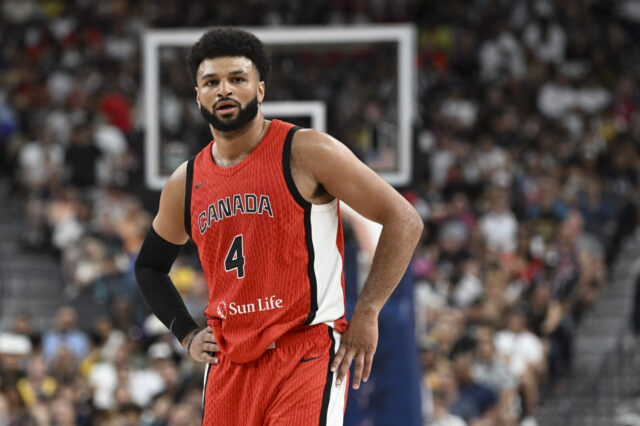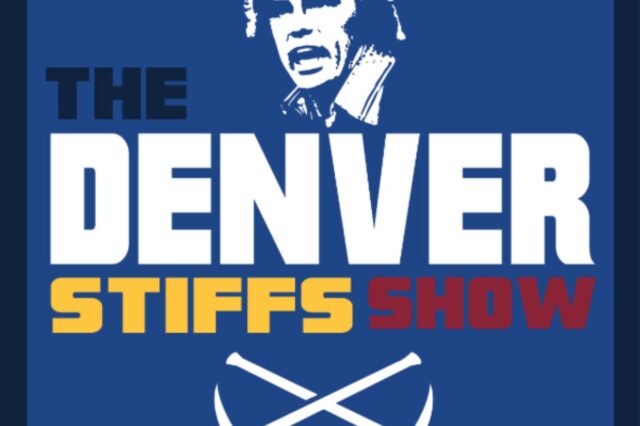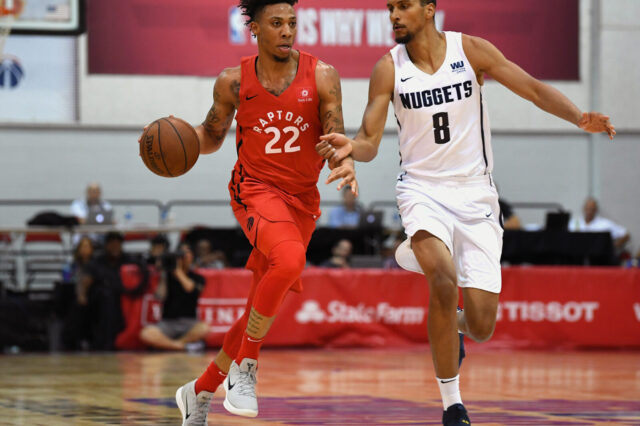By now I’m sure you’ve heard that the Denver Nuggets revealed some snappy new jerseys this week, and I’m personally a big fan of the new style given the departure from the baby blue. These new jerseys feel like a fresh start, of sorts, with an eye toward the future. Combined with the Nuggets young roster, if feels as though a new era of Nuggets basketball is upon us.
It’s impossible to know where you’re going without knowing where you came from so I decided to take a look back at some key moments in Nuggets history to brush you up on your franchise facts before the start of the 2017-2018 season (as if you need it).
The Denver Nuggets first began as the Denver Rockets back in 1967 when an ABA charter was offered to Denver after Kansas City was unable to get organized. Bill Ringsby, owner of the Denver-based Ringsby Rocket trucking system, became the first owner of the Rockets. The orangey-red and black logo for the Denver Rockets was taken directly from Ringsby Rocket’s trucks.
This content is no longer available.
Despite a revolving door of coaches, the Rockets had healthy attendance at the Auditorium Arena, and ultimately proved the city could sustain a professional basketball team. From 1967-1974, the Rockets made it to the Western Division Semi-Finals a total of 3 times, and the Western Division Finals once before losing their footing in their final year and converting to the Denver Nuggets.
This content is no longer available.
In 1972, the Rockets were purchased by AG Fisher, Frank M. Goldberg, and Alex Hannum with J. William Ringsby as a minority owner. In 1974, 33% of the team’s ownership was purchased by Nuggets Management Inc. for $1 million, with the remaining 66% being sold to Nuggets Management Inc. in 1975 for another $1 million.
Team officials changed the name of the franchise to the Denver Nuggets in 1974 honoring the 19th century mining boom in Colorado where people from all over would came to Colorado in hopes of making it rich mining gold and silver nuggets, thus Maxie Miner was created as the team’s mascot. In the summer of 1976, the Nuggets franchise entered into the NBA paying a $3.2 million dollar entry fee.
This content is no longer available.
Under new ownership, the 1974-1975 Nuggets got a fresh start with coach Larry Brown, and assistant coach Doug Moe (Moe would go on to coach the Nuggets from 1980-1990 and become the most winning coach in Nuggets history with a combined record of 432-357). The Nuggets acquired the rights to Bobby Jones and All-Star point guard Mack Calvin from the Spirits of St. Louis (also had to outbid the NBA Houston Rockets for Jones) and quickly became the best team in the ABA. To the surprise of many, Denver was able to secure the Western Division ABA championship title that year leaving their losing record as the Rockets in the dust.
In 1975, the Nuggets signed David Thompson and drafted Marvin Webster (both originally drafted by Atlanta in the NBA but elected to play in the ABA) and traded for All-Star forward/center Dan Issel with the Kentucky Colonels after a previous trade between Kentucky and the Baltimore Claws fell through when the Claws folded. Issel, Thompson and Webster would end up leading the most formidable team in the ABA. The Nuggets ultimately retired Issel’s #44 jersey at the Pepsi Center, and in 1993 Issel was inducted into the NBA Hall of Fame.
Adding to Dan Issel, the Nuggets would go on to retire Alex English #2, David Thompson #33, Byron Beck #40, and Doug Moe #432 (acknowledging his 432 career wins as a coach). In fact, Doug Moe is the one to credit for the Denver Stiffs name. During his time as a coach, he was known for referring to a player as a “stiff” whenever he was either unhappy with their performance, or in some cases to endearingly refer to a player compensating for lack of talent with work ethic.
Playing for the Nuggets from 1979-1990, Alex English is arguably the best Nugget of all time. He was one of the best scorers in the league during his time, ultimately retiring as 7th leading scorer. English averaged 23 points per game for 9 consecutive seasons, was named an All-Star 8 times, and led the Nuggets to 9 playoff appearances during his years with the team. In 1997, he was honored with an induction into the NBA Hall of Fame.
Denver has a list of legends a mile long, and to caption their success in this article alone would do them injustice. However, names like Lafayette (Fat) Lever, Dikembe Mutombo, Kiki Vandeweghe, Allen Iverson and Chauncey Billups are just a few that make up quite an impressive franchise legacy. (Carmelo Anthony intentionally excluded.)
With this in mind, the new generation of baby fresh Nuggs have some big shoes to fill, and a long way to go, but this rebuilding season has truly been encouraging for Nuggets fans. Hopefully, Denver can look forward to having players like Nikola Jokic, Jamal Murray and Juancho Hernangomez on board for the long haul. Who knows, maybe their jerseys will also be retired at Pepsi Center one day.
This content is no longer available.


